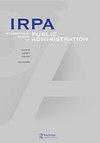研究韩国对行为知情政策偏好的性别差异
International Review of Public Administration
Pub Date : 2020-07-02
DOI:10.1080/12294659.2020.1800199
引用次数: 2
摘要
行为知情政策的全球增长提出了许多关于跨文化和人口统计学应用普遍性的问题。虽然行为经济学的研究结果——助推政策的基础——在基础研究文献中得到了很好的描述,但仍然需要测试在不同背景下应用的各种政策的有效性。这项研究考察了对一些助推政策的偏好差异,并特别关注了韩国人的性别。一项调查衡量了受访者对38项假设的助推政策的认可程度,这些政策被分为7个主题组。结果显示,性别间存在显著差异;韩国女性通常比男性更倾向于渐进的助推政策。研究结果表明,韩国社会有机会运用“助推”,通过进步政策和社会福利发展来优化结果。更广泛地说,这肯定了有必要在不同背景和不同背景下调整推动政策,以获得更好的结果。本文章由计算机程序翻译,如有差异,请以英文原文为准。
Examining gender differences in Korea of preferences for behaviorally informed policies
ABSTRACT The worldwide growth of behaviorally informed policies raises many questions about the universality of application across cultures and demographics. While the findings of behavioral economics – the foundation for nudge policy – are well described in the basic research literature, there is still the need to test the efficacy of various policies applied in different contexts. This research examines the differences of preference for a number of nudge policies, with special attention to the gender of South Koreans. A survey measured respondents’ approval of 38 hypothetical nudge policies that fell into seven topical groups. The results showed significant differences between the genders; Korean women were often more favorable to progressive nudge policies than men. The findings suggest opportunities for applying nudges in Korean society to optimize outcomes with progressive policies and social welfare developments. More broadly, this affirms the need to tailor nudge policies across and within contexts for enhanced results.
求助全文
通过发布文献求助,成功后即可免费获取论文全文。
去求助
来源期刊

International Review of Public Administration
Social Sciences-Public Administration
CiteScore
2.00
自引率
0.00%
发文量
21
期刊介绍:
The International Review of Public Administration (ISSN 1229-4659) is published biannually by the Korean Association for Public Administration (KAPA) to provide a worldwide audience with the opportunity for communication and further understanding on issues of public administration and policy. There will be a triple-blind peer review process for all submissions of articles of general interest. There are no particular limitations on subject areas as long as they are related to the field of public administration and policy or deal with public employees. Articles should be analytic and demonstrate the highest standards of excellence in conceptualization, craftsmanship, and methodology.
 求助内容:
求助内容: 应助结果提醒方式:
应助结果提醒方式:


